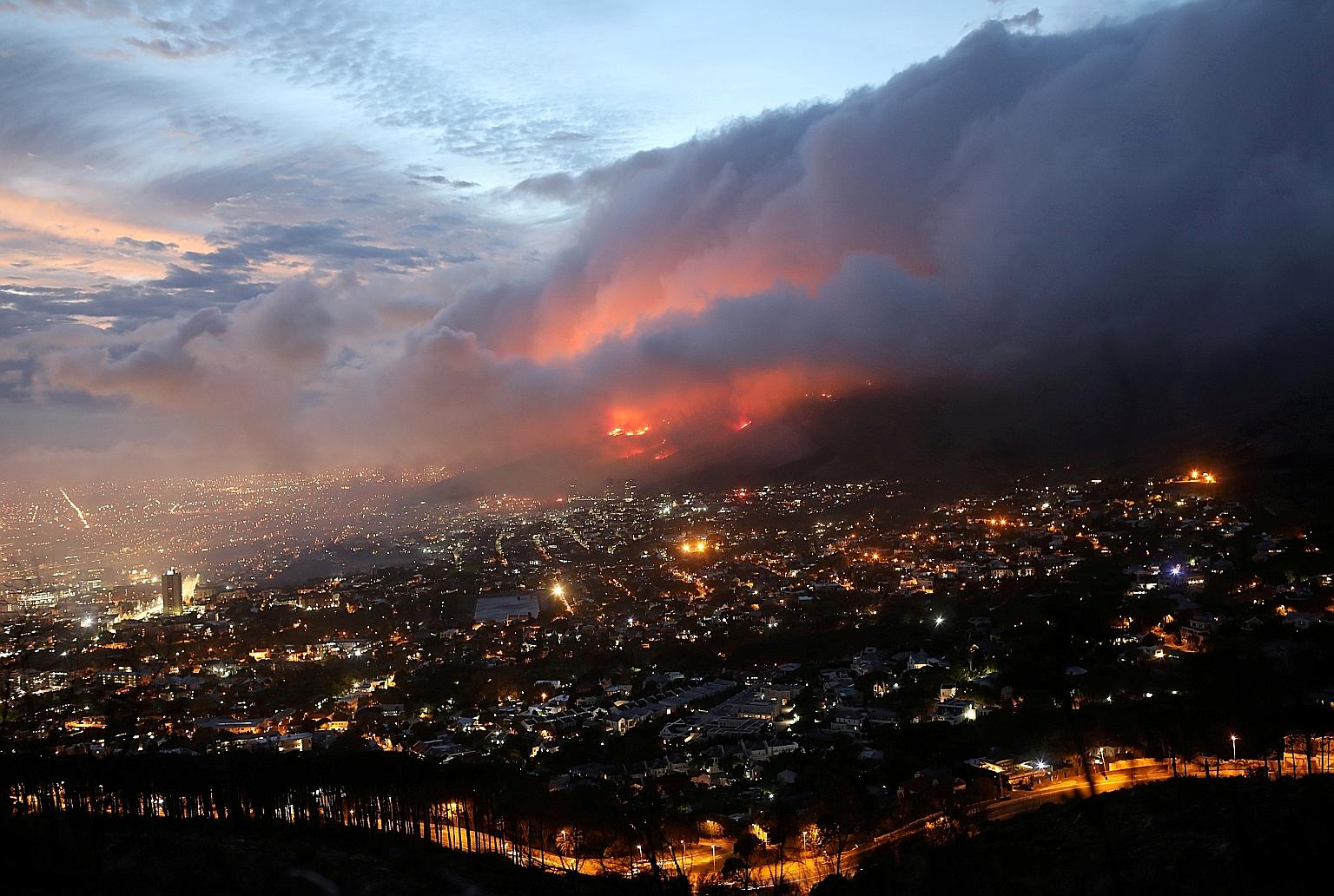US vows to boost climate financing to developing nations
Sign up now: Get ST's newsletters delivered to your inbox

Flames fanned by strong winds after a bush fire broke out on the slopes of Table Mountain in Cape Town, South Africa, earlier this week. Developing countries like South Africa have called on developed countries to do more to help them meet their climate targets.
PHOTO: REUTERS
The United States has pledged to give vulnerable and poor countries a leg up in the pricey fight to combat climate change, by increasing financing to developing countries and mobilising investment from the private sector.
"Good ideas and good intentions aren't good enough. We need to ensure that the financing will be there, both public and private, to meet the moment on climate change," said President Joe Biden, who convened the two-day virtual Leaders Summit on Climate attended by 40 heads of state and dozens of corporate executives and other leaders.
"All of our nations must stand together... to help the world's most vulnerable nations and those bearing the least responsibility for the climate crisis cope with the devastating impacts of the climate crisis," he added during a session on financing climate solutions on Thursday.
Mr Biden announced that the US will double, by 2024, its annual public climate finance to developing countries based on its levels during the later years of the Obama administration.
The US will also treble public financing for climate adaptation - measures to help countries adapt to the impact of climate change - in developing countries by 2024.
In addition, the US launched a plan laying out its vision for financing the world's response to climate change, in recognition of the urgency of the climate crisis and the sharp drop in American international climate finance during the Trump administration.
The plan will also seek to end international investment in fossil fuel projects and steer capital towards "climate-aligned investments".
US Special Presidential Envoy for Climate John Kerry highlighted the need for governments to team up with private investors and international financial institutions in the world's quest to switch fully to non-carbon energy sources.
"Governments alone cannot possibly find all the necessary investment," he said. "There's no government in the world that has enough in their fiscal budgets to be able to provide what we need to make this transition."
Treasury Secretary Janet Yellen said her department will throw its weight into figuring out the best ways that public climate finance can be channelled into mobilising the greatest private-sector investments.
"Past efforts to support private investment have not achieved anywhere near the scale needed to green the global economy," she said.
She added that the Biden administration, on its part, will work with multilateral institutions and has requested US$1.2 billion (S$1.6 billion) for the Green Climate Fund, US$485 million to support multilateral climate initiatives, and more support for development banks in its 2022 budget.
Earlier, developing countries, including India and South Africa, had called on developed countries to do more to help them meet their climate targets.
"We call on developed economies, which historically bear the greatest responsibility for emissions, to meet their responsibilities to developing economies," said South African President Cyril Ramaphosa.
He said that aid for climate change should be provided separately and should not be part of conventional development assistance, adding: "When it is given in the form of loan financing, the debt burden of developing countries is worsened."
International Monetary Fund head Kristalina Georgieva called for an international carbon price floor among the members of the Group of 20, arguing that "a small group of large emitters can facilitate an agreement covering 80 per cent of the global emitters".
Setting a "robust" minimum price could help reduce global emissions, she said, noting that current schemes were inadequate.
But the average global carbon price, which is currently at US$2 a tonne, needs to rise to US$75 a tonne by 2030 to curb emissions in line with the Paris Agreement, said Dr Georgieva.
"A mix of steadily rising carbon prices and green infrastructure investment could increase global GDP (gross domestic product) by more than 0.7 per cent per year over the next 15 years, and create millions of new jobs," she added.
Charissa Yong


